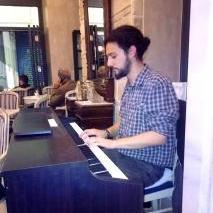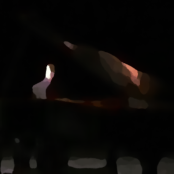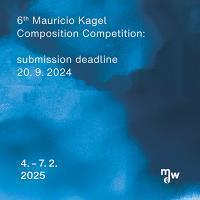Search the Community
Showing results for tags 'piano', 'sonata', 'solo' or 'alevel'.
-
This is my 9th soliloquy for piano. The first 12 bars constitute a sonata beginning/fragment I had composed years ago. So this piece felt kind of like the YC challenges where we composed based on each others' themes, only in this case I composed a piece based on a theme from my 19 years younger self! Here is the link to my 8th soliloquy for piano: http://www.youngcomposers.com/archive/music/listen/6667/soliloquy-for-piano-no-8/
-
I wrote this just for fun, and as a training to write music for full-length films. However, synchronization is a hard work, I had to compose playing the movie all the time. The motorist.pdf
- 11 replies
-
- silent movie
- motorist
-
(and 1 more)
Tagged with:
-
This is my 5th soliloquy for viola. Here is the link to my 4th soliloquy for viola with its two versions: http://www.youngcomposers.com/archive/music/listen/4150/soliloquy-for-viola-no-4/ Since I see that it is no longer possible to comment on pieces from the archives where this previous soliloquy is located, I would ask that anyone who listens to it and would like to comment on it please do so here.
-
- 1 reply
-
- minimal
- contemporery
-
(and 1 more)
Tagged with:
-
Opus 7-1(Allegro misterioso) and Opus 7-2(Moderato grandioso) sonata written for piano and harpsichord(part three coming soon). Opus 7-1.mp3 Opus 7-2.mp3
-
Hello, this is my Ragtime No. 22; I'd like to know how it makes you feel, what impressions it gives you aurally, as a listener.
-
Some piano music....open to new music opportunities. www.carldoesmusic.com
-

It's You I Adore - An Original Lullaby
MrLernerAndLoewe posted a topic in Piano Music, Solo Keyboard
This is a lullaby I wrote a while back that I recorded and performed myself granted I am not a concert pianist :P I feel it sounds similar to maybe Dave Grusin or something of that sort other than being a lullaby. It's You I Adore.mp3 My personal criticisms: Maybe too many block chords Overusing the pedal, however it does enforce that soothing feel. Maybe too slow however yet again it reinforces the form of the lullaby. Now for your feedback and listening :) -
I wrote this piano solo composition in April, released it in May on iTunes and made a video for it in June. Would appreciate your feedback!
-
So, I recently started getting into composing music, and thought starting out with piano might be a good idea. I felt like this is a good place to get some feedback, though I did see most people post scores of their pieces. I don't really have any, since I made this in FL Studio. I hope that's not a problem? Anyway, some thoughts would be much appreciated, personally I felt like I may have had too many repetitions, but I really have no idea.
-
On a whim awhile back, I worked on a set three pieces with the goal that each hand would use a fixed interval to see what I could come up with. I finished two, the first using only thirds and the second using only octaves. I started another etude using sixths, but tabled it after my initial efforts seemed uninspiring. The first etude in thirds is a simple barcarolle which I think would be easy to play. The other etude in octaves, intended to be the third of the set, is a scherzo that probably is unplayable and would break the hands of any performer than tried it. At the time I wrote it, I was studying the piano works of the French composer Charles-Valentin Alkan whose works are notoriously difficult so I think there may have been some influence from that.
-
Written on piano, used Mixcraft for editing.
- 2 replies
-
- minimalism
- electronic
-
(and 1 more)
Tagged with:
-
This is a set of three pieces, though composed individually, that I put together as a single opus number, each reflecting an attempt to compose within a specific style. The first is a "sonata" akin to the single movement works of Domenico Scarlatti. It originally started as a possible movement for my harpsichord concerto which I later just used as a stand alone solo keyboard piece. It is playable for harpsichord or piano. The second is a movement in classical sonata form that was originally an assignment for a music theory class. It's probably the most "pedantic" of the group being in very tight sonata form. The last is a romantic style prelude. It is a piano transcription of the cadenza to the ending of Fantasy for violin and orchestra that I wrote about 5 years ago.
-
Hi everyone! This is a piano piece from my debut EP and It's called "Impression". Althought I'm not very good at determining certain styles,I think it has elements of contemporary piano music and impressionism. I recorded it by myself. Please let me know how you like it!
- 2 replies
-
- impressionism
- contemporary
-
(and 2 more)
Tagged with:
-
This is a suite made of some new and not-so-new material. The name "Lake Suite" (Suíte Lacustre) comes from the surname of my friend Deborah Lago (lago = lake, in Portuguese), to whom this suite is dedicated. The movements are: 1 - Prelude 2 - Cantabile 3 - Elegy 4 - Ricercare 5 - Interlude 6 - Toccata
- 2 replies
-
- 1
-

-
- suite
- neo-classic
-
(and 1 more)
Tagged with:
-
Hi all. Here is the 4th movement of my recently finished sonata in E. It is generally in the style of Beethoven/Mozart. I am quite pleased with how it has progressed. I would value any feedback. I am blessed to be able to share it. The sheet music was written with MuseScore, which is a neat little program. If you wish to listen, simply go follow the link and hit play. Cheers. https://musescore.com/user/9350326/scores/2120656 Because it is being played off the score, it will lack a little of the human touch, but it will give a pretty good idea of the overall sound of the movement. :)
- 4 replies
-
- 4th movement
- sonata
- (and 6 more)
-
A brief piece for cello and piano I quickly wrote. It is among the first of the pieces that I've written in such a style, so I'm always looking to improve. Let me know your thoughts, and thanks!
-
Hi! I just started writing piano pieces, please let me know what you think of these four little compositions! 1) https://musescore.com/user/3451546/scores/1022141 2) https://musescore.com/user/3451546/scores/1114941 3) https://musescore.com/user/3451546/scores/2124431 4) https://musescore.com/user/3451546/scores/2108981 Thank you!
-
When I compose for the piano I can't help falling back to an easy listening - light classical genre... You can find 2 recent pieces here... https://www.youtube.com/results?search_query=composerpj86 The third piece was an improvisation from a cd that I made a few years ago.
-
We are looking for piano pieces written for children and young adults which, although limited in their technical difficulty, remain uncompromising in their artistic aim; pieces written with a contemporary compositional technique which offer the young student stimulus, insight and new experiences: experiences about oneself and the world in which we live. Composers younger than 40 years can submit pieces for piano that are suitable for children and young adults by 15 August 2015. The prize money totals 10,000 Euros. For further information please visit: www.mauricio-kagel-kompositionswettbewerb.com (German) www.mauricio-kagel-composition-competition.com (English) Mauricio Kagel Composition Competition 2015.pdf
-
- composition competition
- composition contest
- (and 8 more)
-
It's been a while since I've been on here. I have put dreams of writing a symphony off until I can manage a small-scale piece (solo piano, for instance), and spent the month of June writing a little bit of something (new) each day. Got through thirty days and had some good ideas in the mix, but the largest problem I had was developing them beyond the 8-10 bars that I'd constructed. That's another issue. I wrote this and somewhat unintentionally expressed the train of thought of an entire day at work (between meetings) despite my efforts to condense it. In the interest of time, I will post the actual question at the end of said train here, and again at the end of my actual post: Based on what factors does one determine whether it is a work of genius, a flop, an acquired taste, or just the housecat prancing around on the Steinway in the living room? An extension of that question, and I suppose the real heart of my issue is, based upon what can I critique the works that I write using this method? What will be my goal in expression if it is not tonal? And now for how I got there. Also, I promise this post about 'atonal' or 'serial' or 'twelve-tone' music or whatever you want to call it is not to troll... but I can see how it may seem that way (or seem like a very amateur question, which not be out of character). In that regard, I recently started playing around with writing out some twelve-tone matrices. The issue I was having with developing or broadening or expanding motivic material lies partly with my imagination, but the root of that problem is probably more in my lack of music theory knowledge (i.e. my ability to use and manipulate the rules of harmony, voicing, etc.). I've studied entirely on my own and have a very good general understanding of (the most basic) harmony, the ideas and concept and treatment of sonata form, and the like, but to get in and start writing music, voicing chords, etc. proves very difficult for me, so it's slow going and very rudimentary. Back to Schoenberg and his twelve tones. In composing in this manner, one of the decisions left to a composer is removed, or at least greatly limited. Generally speaking (incredibly vaguely), a composer deals with a few things: pitch duration orchestration tempo dynamic harmonization intonation or attack Composing based on a twelve-tone row greatly limits if not eliminates the variables of pitch and harmony (obviously hexachords and vertical use of the series are not out of the question, but not with the freedom of choosing to use a minor/major/diminished/ninth chord, etc.), so the others play a much greater role in the style/interpretation feel of the piece. I am realizing that just from my writing out of the matrix. Just to clarify, I'm not talking about integral/total/multiple serialism like in Boulez's piano sonatas, for instance. Just the pitches and their sequences. So my question, ultimately, is this: in the tonal scheme, with tonics and dominants and tonal centers, it is very easy for even a total beginner to hear a piece like a Chopin nocturne or a Mozart sonata and 'understand' it emotionally to some degree or other (happy, sad, peaceful, etc.) because of its use of tonal expression. Even late Scriabin pieces, while highly chromatic, still make use of tonality to express emotion and feeling. People will rate the quality of the music, whether it is 'good' or 'bad', based on their ability to understand it, which as Milton Babbitt has pointed out, only happens in music and politics. My question then, is this (I did say that earlier) : since the average human innately understands the pentatonic scale and has some foundation for understanding "good" use of harmonies to some degree, he can identify with "good" music, or music that adheres to the rules of harmony (more advanced, even to the point of identifying and appreciating key changes, and modulations and their relationships to the tonic). Not being able to hear immediately the relationships between notes in a twelve tone series once we get to the inversion and retrograde, etc. how is one to distinguish "good" serial music from "bad"? I can listen to Schoenberg's op. 11 with some degree of appreciation, but it's a stretch. I have absolutely zero comprehension for Boulez's sonatas or anything by Babbitt, though. Based on what factors does one determine whether it is a work of genius, a flop, an acquired taste, a work with potential, or just the housecat prancing around on the Steinway in the living room? An extension of that question, and I suppose the real heart of my issue is, based upon what can I critique the works that I write using this method? What will be my goal in expression if it is not tonal? I suppose that is a subjective and individual question, but it still seems one worth asking. Thanks in advance for thoughts and ideas.
-
Hi, I was wondering about sonata form. In a classical period style sonata in a major key, two different theme groups found in the exposition are usually in the tonic (group A) and dominant key (group B) of the piece. In general, how do these different theme groups A and B differ from one another? (With regards to melodic content, liveliness, dynamics, etc.) And, conversely, should they share any characteristics or motives? If you're interested, I'm wondering what sort of group B to follow the first half of the exposition in this piece: http://www.youngcomposers.com/music/listen/6083/woodwind-trio-in-eb/ Any help, suggestions or insight would be greatly appreciated!
-
Alright, so Sonataform and I have both written pieces for piano in the span of 3 days, and now it's up to you to decide who won. The criteria for judging are solely your own, choose wisely. Here are the entries Sonataform: http://www.youngcomposers.com/music/5879/variations-on-michelle-in-the-style-of-brahms/ Thatguy v2.0: http://www.youngcomposers.com/music/5877/cheese-at-night/












